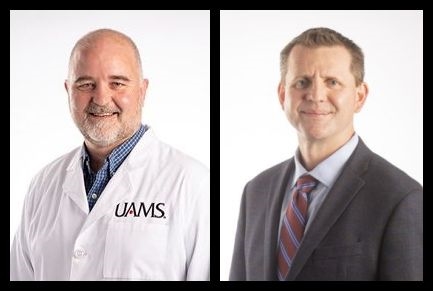
Professors Ricky Edmondson and Alan Tackett of the University of Arkansas for Medical Sciences will give a seminar titled "Discovery proteomics: High(er)-throughput" on Zoom from 4-5 p.m., Friday, Oct. 1. Everyone is welcome to attend the seminar individually via Zoom or to come to SCEN 0203 where the seminar can be viewed in person with other attendees. The talk is free and open to the public.
Edmonson's area of expertise is mass spectrometry-based proteomics, and he has been involved in discovery proteomics for over 25 years. He has been involved in collaborative proteomics projects his entire scientific career and constantly develops workflows to utilize protein mass spectrometry to answer the biological question at hand. Edmondson has spent many years working with precious clinical samples and has optimized workflows to maximize the analysis that can be done with minute sample amounts. For the last 13 years, he has co-directed the UAMS Proteomics Core Facility, where he is involved in project design and the daily operation and maintenance of the UPLC nanospray mass spectrometry systems.
Edmondson has worked with hundreds of researchers to provide discovery proteomics services through the UAMS Core Facility. In the last year, the core has been transitioned to serve researchers across the country with the formation of the NIGMS IDeA National Resource for Quantitative Proteomics. Prior to his arrival at UAMS, he served for five years as the director of the Center for Proteomics at the FDA's National Center for Toxicological Research. Edmondson also has six years of experience in leading Discovery Proteomics in a commercial setting within the pharmaceutical and biotechnology industry. He has published 61 peer-reviewed manuscripts, written book chapters and submitted two U.S. patents.
Tackett's areas of expertise include proteomics, mass spectrometry, cancer epigenetics and melanoma cancer biology. He holds the Scharlau Family Endowed Chair of Cancer Research, directs the NIH IDeA National Resource for Quantitative Proteomics, directs a NIH Center of Biomedical Research Excellence in systems biology and serves as deputy director of the Winthrop P. Rockefeller Cancer Institute. Tackett has been continuously funded as a PI for his entire career by NIH using the F32, R01, R33, R21, P20 and R24 mechanisms. Furthermore, he has served over 20 co-investigator roles on NIH grants, published 128 manuscripts and served on 58 NIH study section panels.
Advances in mass spectrometry have fueled the growth of large scale discovery proteomics experiments in recent years. While not to the level of high throughput in the genomics arena, the capacity in discovery proteomics has rapidly increased. Through the use of stable isotope labelling, samples are individually labeled then mixed for analysis. This sample multiplexing can increase throughput by 16 fold. Proteomics experiments with dozens of samples can be processed using these stable isotope methods by coupling several batches. For experiments that require the analysis of hundreds of samples, a label free approach is available that takes advantage of new methods involving data-independent acquisition. This presentation will detail these discovery approaches and give examples of the results and protein depth that can be achieved with a variety of common sample types: serum/plasma, cell culture and FFPE (formalin fixed paraffin imbedded) archived tissues.
To attend the seminar, please visit the Zoom link.
- Meeting ID: 870 1464 3915
- Passcode: jq8WX=Dg
Topics
Contacts
Megan Parette, communications specialist
Department of Chemistry and Biochemistry
479-575-4601, mbparett@uark.edu